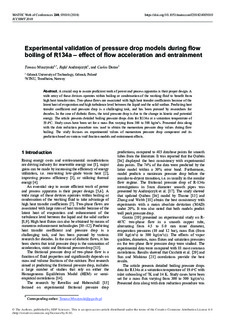Experimental validation of pressure drop models during flow boiling of R134a – effect of flow acceleration and entrainment
Journal article, Peer reviewed
Published version
Permanent lenke
http://hdl.handle.net/11250/2587286Utgivelsesdato
2018Metadata
Vis full innførselSamlinger
Originalversjon
https://doi.org/10.1051/matecconf/201824003010Sammendrag
A crucial step to assure proficient work of power and process apparatus is their proper design. A wide array of those devices operates within boiling or condensation of the working fluid to benefit from high heat transfer rates. Two-phase flows are associated with high heat transfer coefficients because of the latent heat of evaporation and high turbulence level between the liquid and the solid surface. Predicting heat transfer coefficient and pressure drop is a challenging task, and has been pursued by researchers for decades. In the case of diabatic flows, the total pressure drop is due to the change in kinetic and potential energy. The article presents detailed boiling pressure drops data for R134a at a saturation temperature of 19.4°C. Study cases have been set for a mass flux varying from 300 to 500 kg/m2s. Presented data along with the data reduction procedure was used to obtain the momentum pressure drop values during flow boiling. The study focuses on experimental values of momentum pressure drop component and its prediction based on various void fraction models and entrainment effects.

